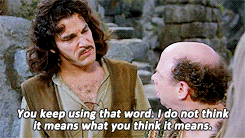How to change the world
How does one change the world?
It’s the question I think about more than anything else (more on that later). It’s also something people routinely claim to be in pursuit of, or already doing, and thankfully, some people truly are out there trying to change the world.
Today, I want to cover two different sides of changing the world:
- What it means when we say “change the world.”
- How to go about changing the world.
In order to address both, we have to start in the same place: language.
Meaning
There’s a phenomenon known as semantic satiation where a word temporarily loses meaning and becomes just sound. Say a word over and over like carpet, nucleus, cheese, or anything else, and at some point, the word will stop meaning anything. It’s just mouth sounds.
Something similar can happen with phrases and we commonly refer to it as a platitude. A platitude is when a phrase has been used so often it loses meaning. However, there is an important difference between semantic satiation and platitudes.
- In semantic satiation, the loss of meaning is about disassociation. The sound is disassociated from its data and the word literally no longer means anything, it is reduced to sound.
- With platitudes, the loss of meaning is more about the dilution of its significance, importance, or purpose. We still all know what it means, but it is no longer impactful.
This is important because there are a handful of phrases that I feel sit somewhere between semantic satiation and a platitude. Unfortunately, there is no word for it that I have found. I’ll give you the two examples that best illustrate what I’m talking about:
- When you say “God bless you” after a sneeze.
- When you say “change the world” in your mission statement.

Both of those phrases are reflexively used to such an extent that they’ve become disassociated from any meaning and also diluted from the intended significance.
In the case of changing the world, here’s how we make sure the phrase continues to mean something.
Defined
In order to ensure that we avoid the traps of platitudes and semantic satiation, we need specificity.
The loophole that people have been exploiting by using this aspirational phrase without context is the reality that, on a certain level, EVERYTHING “changes” the “world.” And so we get this…
“You change the world by being yourself.”
-Yoko Ono

If you define the world as your perspective and immediate circumstances, and change as anything that differs over the passage of time, then every passing second of your life is change. If we blow out our perspective to see the world as the material interconnection of all living things on our planet, then every interaction is a material contribution to changing the world…like a cascading stack of dominoes.
There’s nothing inherently wrong with saying vague or pithy statements about changing the world unless you actually intend to make a material change to the world.
If you actually want to facilitate actual, measurable change in the world, you need to know what represents success. Therefore, in order for the phrase to have any meaning at all, we must first define what we mean by “change” and next, of equal importance, we must define “the world.”
My suggestion is that you start by answering these three questions:
- What is the specific change?
- Is it BIG or is it small?
- What is the scope? Define what you mean by “the world.”
- Is it global, national, local, or personal?
- What is the timeline?
- Will this be accomplished in our lifetime or are you starting an incremental change for future generations?
It’s only after you’ve gotten clear on the specifics of those three questions that we can separate the meaningful attempts at change from the trite reflexive usage that dilutes the phrase.
Moving forward, I hope we collectively agree to push those who say they want to change the world by requiring them to define what they mean. Otherwise, how will you know if you want to support their mission?
How to Change the World
Assuming you’ve thoroughly defined what you mean by changing the world, the next step would be to explore how to go about realizing that vision. We might start by looking at what those who have changed the world have said on the subject.
In preparation for this post, I read through more than 100 quotes about changing the world. There were three themes that I saw emerge as being the most important.
Because these were themes, none of the individual components will be particularly surprising. However, what makes this framework unique, is that while each piece is powerful on its own, it is the combination of these three elements into a unifying theory that gives us the best chance of actually changing the world.
Are you ready? Here are the three components for changing the world…
Togetherness
“When we organize with one another, when we get involved, when we stand up and speak out together, we can create a power no government can suppress.”
-Howard Zinn
Going through the library of quotes about changing the world, it’s easy to find the theme of togetherness. That’s because even though one person could change the world on their own, it’s easy to see how power multiplies as we multiply. Movements are the product of collective action, and the greater the numbers, the higher the likelihood of change.
If you want to change the world it is unlikely that you will do it alone. Therefore, you must learn the skills of leadership and communication. You must have the ability to connect with others. This requires your vulnerability, empathy, compassion, and kindness.
If you wish to bring people together and form a movement for change, you will likely not succeed without these skills.
Alignment
“Inspire people to do the things that inspire them and, together, we can change our world.”
-Simon Sinek
While I love most of Simon Sinek’s work, I don’t like this quote because it falls back on the definition of “change the world” that includes basically anything and everything. If you want to make a specific change in the world, which is what I would argue anyone who uses the phrase ACTUALLY wants, then you need to get aligned about the change you want to make.
Movements are most effective when everyone is moving in the same direction. Therefore, you must learn the skills of strategy, communication, and leadership. You must have the ability to inspire, listen, and validate. You need to have the tools to manage and resolve conflict and keep everyone moving toward the same goals.
Action
An object at rest will remain at rest unless acted on by an unbalanced force. An object in motion continues in motion with the same speed and in the same direction unless acted upon by an unbalanced force.
-Newton’s First Law of Motion: The Law of Inertia
Our world is the product of countless forces being exerted at all times. Significant change in the direction or speed of the world, requires significant action.
Activists are active. Movements can’t stand still. All change requires us to DO something.
At some point, all ideas and talk must become action.
Therefore, you must learn the skills that help you manage projects and logistics. You need to be able to coordinate action among teams. You need to be able to keep people motivated and inspired. You need to be able to lead and to delegate.
How will you change the world?
Togetherness + Alignment + Action
First, you clearly define the change you wish to make. Then, you gather the people who align behind this movement for change. Then, you take action.
So, what change will you make?
If I may be so bold…
“You have to act as if it were possible to radically transform the world. And you have to do it all the time.”
-Angela Davis
“Every moment is an organizing opportunity, every person a potential activist, every minute a chance to change the world. “
-Dolores Huerta
Do not waste your time and energy trying to make small changes. Your life is an opportunity. The world needs superheroes, and we need them to work together. We have profound opportunities to make the world, kinder, safer, and more equitable. Let’s not miss our chance.
As for how I plan to change the world…that’s coming up in my next post.
